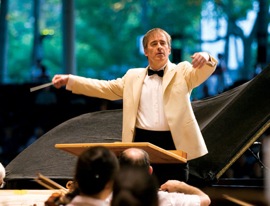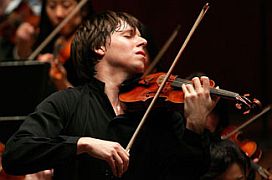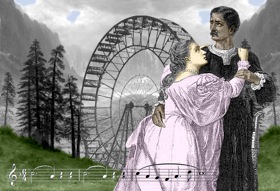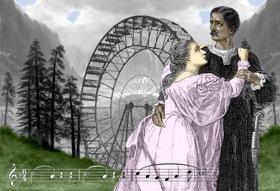James Conlon is one of the finest conductors around, and he is also a maverick presenter of unusual programs.

Currently music director of the Los Angeles Opera, Conlon previously headed the Paris National Opera, the opera and symphony of Cologne, the Rotterdam Philharmonic, among others. Besides leading Cincinnati's May Festival for three decades, he has guest conducted major opera companies and symphonic orchestras around the world.
During this long and distinguished career, Conlon, 60, has consistently brought to audiences rare and some never performed works. He has been spearheading a major effort, "Recovered Voices," to preserve and present works of composers who perished in the Holocaust or whose music was suppressed by the Nazis.
And so it was expected that he would bring something different to his current appearances with the San Francisco Symphony (which he first led 32 years ago), and he did not disappoint.
Imagine a program that features four overtures, three of which are linked together in an impromptu symphony. The stand-alone, and well-known overture was the Prelude to Wagner's "Die Meistersinger von Nürnberg," and Conlon, opera conductor extraordinaire, did wonders with it.

He brought tremendous energy and precision to the festive piece, brightening the mood of a full house where most of the audience was aware that the Giants had just lost a crucial playoff game. The orchestra, always playing well for Conlon over the years, responded in prime form.
And the reason Davies Symphony Hall was full: Joshua Bell was playing, and not just anything, but the Bruch Violin Concerto No. 1 in G Minor, a virtuoso piece if ever there was one.
Much of the greatness of Bell is that the difficulty of whatever he plays is never evident. From the very first notes through the lyric beauty of the Adagio and the rip-roaring Finale (noted appropriately as Allegro Energico), there was no question of right notes, right intonation, right dynamics — all you could hear was the beauty and power of the music.
Ordinary humans would be more than satisfied by such a sensational performance of a difficult work, but not Bell. For the encore, he played the Vieuxtemps Yankee Doodle Variations, bringing the house down again.

The Conlon special was a linked performance of three 1891 Dvorák overtures, preceded by a fascinating lecture by the conductor about the works, the neglect of two of them — he offered a prize to anyone who attended the last SFS performance of one, which was in 1925 — and their structure. Conlon also spoke of "neglected great music," perhaps an overstatement.
The three brief pieces (13, 10, and 15 minutes in length) are In Nature's Realm, Carnival, and Othello, depicting "nature, life, and love," according to Conlon. They were performed, at the conductor's request, without applause between them, similar to movements of a symphony. Nature is pretty and melodic, something that would serve well as ballet music. The robust Carnival, of course, is the well-known, frequently-played piece, and Othello — more frequently heard in Europe — had its only second performance by SFS.
Othello, said by Conlon to encompass several great operas, is the most substantial of the three musically, but its claim (by Dvorák) to convey elements of Shakespeare's play is not fully met. Lyric and introspective passages dominate, and representations of the drama's climactic moments are muted.

